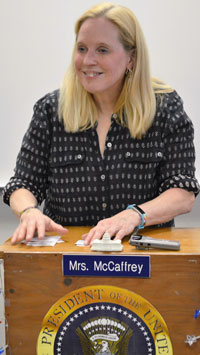Hallea Michell strode into social studies teacher Susan McCaffrey’s classroom and approached a podium with a miniature White House on top and the presidential seal affixed to the front. “All rise!” she bellowed as she banged a gavel.
It was the beginning of a new case to be heard by the class of eighth-graders-turned U.S. Supreme Court justices. McCaffrey’s third- and fourth-hour students had broken into teams of two and three, then spent three school days researching cases assigned to them. One team served as petitioner and one team served as the respondent (similar to, but not the same as, plaintiff and defendant).
“We make this pretty official,” McCaffrey explained as she readied each table. “Everyone gets a legal pad and a bottle of water.”

In Loco Parentis?
First up on this day’s docket: Board of Education v. Pico, a case involving the First Amendment and a school board’s removal of 11 books from its junior and high school libraries it had deemed objectionable.
“Why can’t the books just go in a different part of the library?” asked Justice/eighth-grader Ainsley Workman.
“The school board can decide what is obscene, and even if the books were in a separate section, they’d still be in our library,” answered petitioner Julia Ernst.
After a handful more questions, Chief Justice McCaffrey announced it was time for closing statements. That’s when respondent Noor Duoibes looked from left to right. Her teammate was supposed to do that, and she’s absent, Noor explained.
“You’re just going to have to wing it,” McCaffrey said.
The crux of Noor’s statement: “Taking information from kids is just stripping them of trying to learn,” she said.
Petitioner Julia Ernst argued “in loco parentis,” which amounts to “the school district did what they thought was best for the students,” she said.

Past Rulings, New Angles
McCaffrey has led her eighth-graders in the Supreme Court simulations all eight years she has been teaching at the middle school, but she says other teachers have done it longer.
“They always surprise me, they’re so into it,” McCaffrey said. “A lot of times as they’re walking out of class, they’re still arguing their cases.
“And they sometimes come up with angles I’ve never thought of.”
McCaffrey chooses the cases, and tries to include a few that involve schools such as Board of Ed. v. Pico, as well as some cases that have yet to be decided.
Even if there’s been a final ruling, she said, “they learn that there have often been so many appeals that have reversed earlier decisions, that coming up with something new is entirely possible.”
McCaffrey said this year she’s encouraging her students to write to the real Supreme Court justices to let them know about their simulation and the results.
“I don’t think they get a lot of fan mail, and I can just imagine Ruth Bader Ginsburg getting a real kick out of it,” she said.
CONNECT
Supreme Court of the United States














